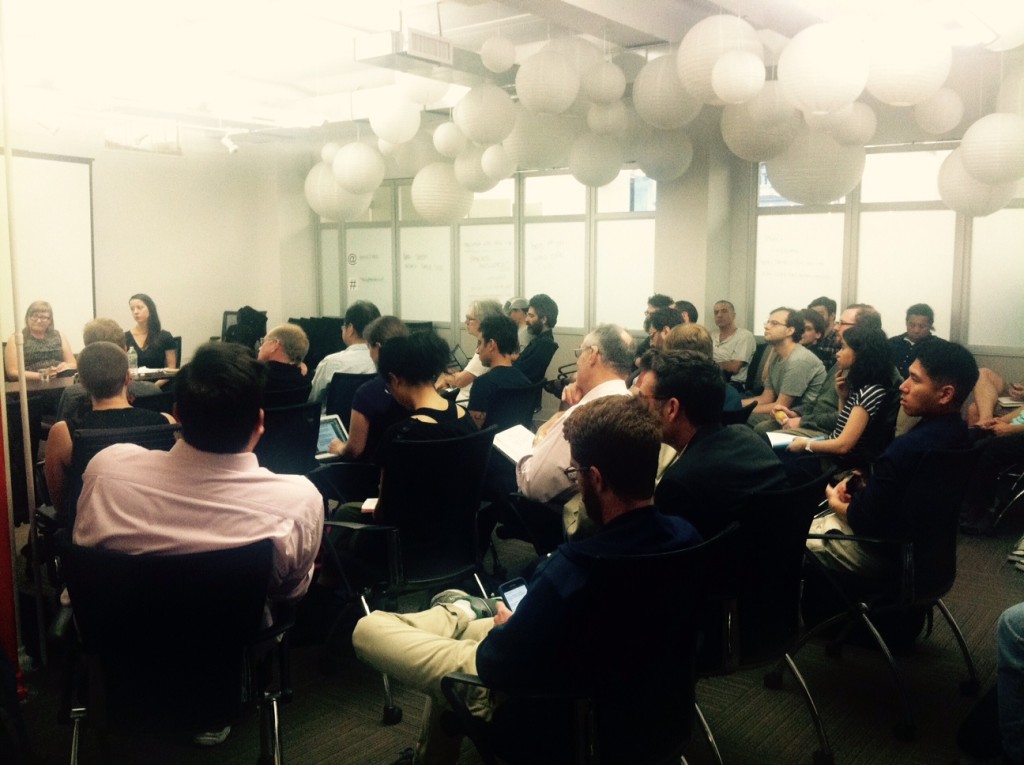On Monday, June 15, 2015, I participated in a panel at Techno-Activism Third Mondays (TA3M) entitled, “Libraries, Digital Privacy, and Data Literacy” hosted at ThoughtWorks. The event was described as “a conversation for those concerned about the impact of surveillance and data collection on citizens, specifically on disadvantaged communities” and space to “learn more about the privacy and data issues that librarians face in their work and new efforts to empower them to address these issues.”

Group gathered for TA3M on 6/15/15, photo by Bonnie Tijerina
RESOURCE: Description of TA3M: “Libraries, Digital Privacy, and Data Literacy.”
RESOURCE: Audio from TA3M: “Libraries, Digital Privacy, and Data Literacy” courtesy of Joly MacFie from Internet Society.
TA3M: “Libraries, Digital Privacy, and Data Literacy”
Panelists included Melissa Marrone, Seeta Peña Gangadharan, Bonnie Tijerina and Alycia Sellie. Moderated by Audrey Evans.
I captured some of the bullets here for you but if you are interested, please check out the audio file linked above or youtube video embedded below. We covered topics like these:
- The public library experience regarding patron’s computer literacy and comfort online. Melissa explains the full range of patrons that come to Brooklyn Public Library and the types of online surveillance and privacy concerns they have.
- Issues in academic libraries, especially around purchasing e-content that has strong DRM and restrictions. Often this means vendors have access to library patron reading behaviors and search behaviors.
- Alycia and Melissa discuss the tough cultural, political and some times legal requires that keep their organizations from making changes that could improve patron privacy.
- Seeta Peña Gangadharan talked about how this is especially bad for vulnerable populations who live in a constant surveillance state and that libraries, with their values and concern for privacy are very important community partners.
- I talked about the variety of projects being worked on and funded right now due to increased interest in libraries taking on a bigger role in the privacy conversations and education.
- I talked about what the next steps might be after this initial wave of excitement and interest. How can we work with technologists who care about these issues to help libraries make real their commitment to privacy?

Image source: “Privacy” by g4ll4is, used under CC BY-SA 2.0 / Original cropped and resized for invitation to TA3M: “Libraries, Digital Privacy, and Data Literacy” on Facebook.
From this event, I took away several key points.
- I think libraries for the most part don’t realize all the ways they are no longer ensuring privacy of their library patrons. How do we work on changing this beyond what is being done right now?
- There is a confluence of energy – from projects like the Library Freedom Project, our IMLS Data Privacy Project, San Jose’s Knight Prototype project, ALA’s Choose Privacy Week to the media’s current interest in librarians in The Nation, On the Media, and other places.
- There’s a hard problem between providing access to as much information as possible and just ensuring access to only stuff that fits our values (which would be less access to materials where vendors don’t meet digital privacy standards).
- We don’t yet have digital privacy standards but we’re working on it. A few of us are optimistic about the future because we are working on this now. For example, the Census Framework group will be meeting at ALA with the hope of coming to come principles.
- While we are working on ensuring better privacy, what are libraries doing in the meantime to inform their users that their searches may not be secure? This was really an unanswerable question and a question where we are kind of stuck. I fear libraries don’t even know all the ways they may no longer be ensuring privacy so it’s no surprise they are not informing their patrons of potential vulnerability.
- Libraries can have a lot of influence over their vendors when they can take a stance together. There have been many examples of this. I saw this with COUNTER-compliant usage stats. It is expected of ebook and ejournal vendors because if enough librarians asked for it. If libraries come up with license language or a statement to get behind to push to vendors and they are behind it, librarians can have a lot of influence. I am optimistic that we can make a change if we gain consensus in the field.
The session ended with some large questions.
Are libraries be an alternative to the always-on government and commercial surveillance state? The answer is no, but maybe the better questions are ‘Should they be?’ and ‘How can they be?’
What partnerships with the tech community (the part of the community who cares) can help make that happen? A good start and a big need would be to create more user-friendly, usable privacy tools.
I encourage you to listen to the audio or watch the video.
Learn more about Techno-Activism Third Mondays.
